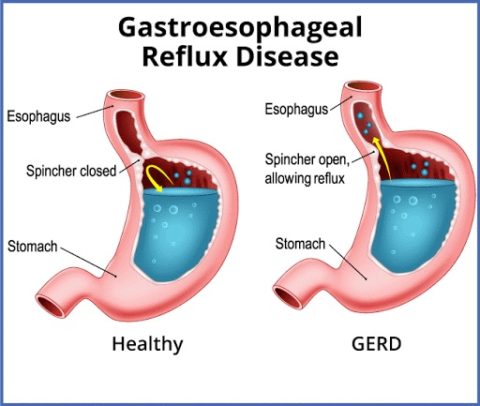Gastroesophageal Reflux Disease (GERD) is a digestive disorder that occurs when acidic stomach juices, or food and fluids back up from the stomach into the esophagus. GERD affects people of all ages—from infants to older adults. People with asthma are at higher risk of developing GERD.
What’s acid reflux and GERD?
Acid reflux happens when contents from your stomach move up into your esophagus. It’s also called acid regurgitation or gastroesophageal reflux.
If you have symptoms of acid reflux more than twice a week, you might have a condition known as gastroesophageal reflux disease (GERD).
According to the National Institute of Diabetes and Digestive and Kidney Diseases (NIDDK), GERD affects about 20 percent of people in the United States. If left untreated, it can sometimes cause serious complications.
GERD symptoms
Acid reflux can cause an uncomfortable burning feeling in your chest, which can radiate up toward your neck. This feeling is often known as heartburn.
If you have acid reflux, you might develop a sour or bitter taste at the back of your mouth. It might also cause you to regurgitate food or liquid from your stomach into your mouth.
In some cases, GERD can cause difficulty swallowing. It can sometimes lead to breathing problems, like a chronic cough or asthma.
GERD causes
The lower esophageal sphincter (LES) is a circular band of muscle at the end of your esophagus. When it’s working properly, it relaxes and opens when you swallow. Then it tightens and closes again afterwards.
Acid reflux happens when your LES doesn’t tighten or close properly. This allows digestive juices and other contents from your stomach to rise up into your esophagus.
GERD treatment options
To prevent and relieve symptoms of GERD, your doctor might encourage you to make changes to your eating habits or other behaviors.
They might also suggest taking over-the-counter medications, like:
In some cases, they might prescribe stronger H2 receptor blockers or PPIs. If GERD is severe and not responding to other treatments, surgery might be recommended.
Some over-the-counter and prescription medications can cause side effects. Find out more about the medications that are available to treat GERD.
Surgery for GERD
In most cases, lifestyle changes and medications are enough to prevent and relieve symptoms of GERD. But sometimes, surgery is needed.
For example, your doctor might recommend surgery if lifestyle changes and medications alone haven’t stopped your symptoms. They might also suggest surgery if you’ve developed complications of GERD.
There are multiple types of surgery available to treat GERD. Click here to read about the procedures that your doctor might recommend.
Diagnosing GERD
If your doctor suspects you might have GERD, they’ll conduct a physical exam and ask about any symptoms you’ve been experiencing.
They might use one or more of the following procedures to confirm a diagnosis or check for complications of GERD:
- barium swallow: after drinking a barium solution, X-ray imaging is used to examine your upper digestive tract
- upper endoscopy: a flexible tube with a tiny camera is threaded into your esophagus to examine it and collect a sample of tissue (biopsy) if needed
- esophageal manometry: a flexible tube is threaded into your esophagus to measure the strength of your esophageal muscles
- esophageal pH monitoring: a monitor is inserted into your esophagus to learn if and when stomach acid enters it.

